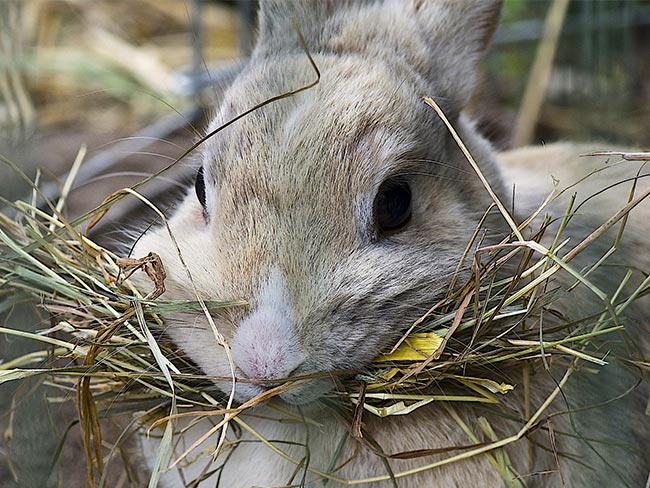Rabbits can have quite a number of health issues and one of them is about their digestive system. Before owning a rabbit, understanding the problem will allow you to better care for your pet and minimize future health care problems.
You need to know: Rabbits are “hindgut fermenters”
First of all, you need to know that rabbits are hind-gut fermenters, meaning that they have an organ called the “cecum”, that functions much like the rumen of a cow, but instead of being at the beginning of the digestive tract it is at the end. Cecum is full of special microbes and good bacteria that break down and digest high fiber diet that enter the cecum.
Rabbits require a high amount and high quality of fiber from the forage in its diet as that is a major energy source for them and an effective tool for maintaining the microbial population in the cecum. Healthy microbial populations in the cecum are critical for proper digestion and optimal gut health.
Why is dangerous for rabbit to stop eating?
As an animal with hindgut fermenters, healthy microbial populations in the cecum are critical for proper digestion and optimal gut health. Normal movement of the gut is essential to keep the food that is eaten moving through quickly, so the rabbit can extract energy from it.
Unlike many other species, who can cope with occasionally missing a meal, rabbits need to eat regularly to keep their guts moving. If your rabbit stops eating, even just a little bit of time, this is a serious concern. Once rabbits digestive movement being slower, its microbial populations in the cecum will be influenced and being imbalanced. If rabbits have stopped eating completely, they are at risk of serious complications such as gut stasis, dehydration and liver disease which are life-threatening.
Know more about rabbits digestion health
The rabbit gastrointestinal tract is a highly complex structure that processes and digests food, largely with the help of a huge population of bacteria. The normal functioning and movement of the GI tract and the health of its bacterial flora are vital to the rabbit’s health, but with such a complex system, things can easily go wrong, any disturbance can tip the balance into a state of disease which may rapidly become life-threatening.
It is important to remember that as soon as a rabbit stops eating, the motility of the GI tract will be affected, even if a rabbit does not start off with a GI motility problem, can cause serious disease if untreated.
Here are the causes that may make your rabbit inappetence and it can be due to multiple factors.
- Lack of dietary fiber
- Anorexia
- Dental problem
- Chronic dehydration
- Environmental stressors:
- Proximity of predators
- Proximity of a dominant/competitive rabbit
- Sudden change of diet
- Change of housing
- Transport
- Extremes of weather/temperature
- Loss of a companion
- Pain
- Post-surgical adhesions
- Ingestion of toxins (e.g. lead)
- Foreign bodies
Understand the path of digestion
Food travels from the stomach to the small intestine, where it encounters enzymes which aid in digestion and absorption of nutrients. From there it travels to the cecum, where the microbial breakdown of fiber occurs. It then enters the large intestine, where there is significant water resorption, followed by excretion of the feces.
If the cecum occurs at the end of the digestive tract, how do the nutrients released from the fiber get absorbed? Some of them, such as volatile fatty acids, can be absorbed directly through the cecal epithelium. However, other nutrients such as amino acids, vitamins and minerals, are excreted in a special soft fecal pellet known as “night feces” due to the fact that they are excreted only at night. Rabbits would practice coprophagy, they eat these special night feces directly from the anus. It is an extremely efficient way for rabbits to capture and utilize the nutrients produced by the fermentation of feeds in the cecum. So if you discover your rabbit eating poo, calm down and it’s just a normal thing.
If you notice your rabbit is eating less than normal/ stop eating, it’s extremely important to contact your vet straight away.
Please contact us for more advice, or make an appointment if needs.


